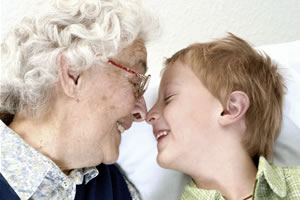Symptoms & Strategies for Early Stages

There are several symptoms your loved one may face with an early-stage Alzheimer's diagnosis. Be sure not to confuse this with early-onset Alzheimer's, which means the diagnosis was made before age 65. Remember that your loved one may not be experiencing all of these symptoms, but may have varying degrees of severity of any one or more of these common ones:
- Forgetfulness is quite common as one ages, and people often wonder if they can't remember the dog's name on the first try, that they may have Alzheimer's. But forgetfulness when someone has this disease is more than that – it's about forgetting the purpose of things. For example, someone with Alzheimer's may see a glove and recognize that it's an article of clothing, but may not remember what part of the body it goes on or that it's meant to keep them warm.
- Difficulty concentrating. Often people with early-stage Alzheimer's may not be able to segue from one thought to another. This is why it's common for them to stop using computers early on. It's also a good reason to set a precedent of using only the microwave, and only for heating up coffee or tea, as opposed to using the stove for cooking or warming.
- Communication problems. You may notice that your loved one with Alzheimer's repeats herself a lot. For some people, you can almost set your watch by it – they may have a conversation with you for about 15 minutes, and then they begin the conversation over again about the same topic you've just discussed.
- Work issues. If your loved one is still working, it's probably best to be open and honest with her employer and let them know what's going on. She may not be able to operate in her position the same way, but if her employer understands her condition, they may be able to change some of her tasks to better accommodate the new way she's processing information.
- Depression. Mood changes can occur when your loved one has a diagnosis. It's an incredibly difficult thing to hear that you have any disease, but especially Alzheimer's. The best way to combat depression is with not only awareness and education about the disease, but with support from peers. Make sure your loved one understands the disease, and that it's possible to have a quality life while they are in the midst of it. Keep her involved in family and social activities, support groups, and maybe even have her talk to a therapist about the conflicting emotions she's feeling. If you feel your loved one may be a danger to herself or others, or is feeling overwhelmed and depressed, seek medical attention.
- Coordination. Apraxia is the medical term for the motor skill degeneration that happens in an Alzheimer's-afflicted person's brain. They may not remember how to do some basic tasks, but can often be helped if they see someone else going through the motions.
- Driving issues. This can be a warning sign of dementia or Alzheimer's disease. If you find an unusual amount of scratches and dings on your loved one's car, it may be time to discuss whether or not he should drive anymore. Driving is a serious issue for seniors, who have the second-highest crash fatality rate of any group other than teenage boys. Talk with your local Area Agency on Aging about when the time is right to take the keys away.
Of course, any of these issues can only be called Alzheimer's when diagnosed by a doctor. If your loved one is experiencing any of these issues and has not gotten a diagnosis, make sure you talk to your medical professional as soon as possible. Medications used for the disease work better the earlier after diagnosis treatments start, so timing is important.
» Symptoms & Strategies for Mid Stage





 Alzheimer's Hope Forum & Message Boards
Alzheimer's Hope Forum & Message Boards